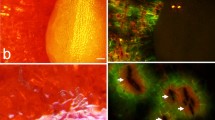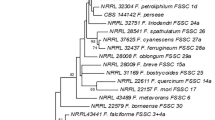Abstract
WHILE making certain experiments designed to test the efficacy of various fungicides we encountered an interesting phenomenon. We noted that when the cut surfaces of potato tubers were dipped momentarily in a 2½ per cent solution of copper sulphate, Penicillium developed copiously on these cut surfaces within five days if they were kept under moist conditions, but similar untreated surfaces were uncontaminated by this or any other fungus. Further cut surfaces of sugar-beet, turnip, Jerusalem artichoke, carrot, and onion reacted similarly, although growth was less noticeable on carrot ; here also un treated cut surfaces did not readily develop fungal growth.
This is a preview of subscription content, access via your institution
Access options
Subscribe to this journal
Receive 51 print issues and online access
$199.00 per year
only $3.90 per issue
Buy this article
- Purchase on Springer Link
- Instant access to full article PDF
Prices may be subject to local taxes which are calculated during checkout
Similar content being viewed by others
Author information
Authors and Affiliations
Rights and permissions
About this article
Cite this article
WESTON, W., TAYLOR, R. Development of Penicillium on the Cut Surfaces of Certain Vegetables. Nature 151, 54–55 (1943). https://doi.org/10.1038/151054b0
Issue Date:
DOI: https://doi.org/10.1038/151054b0
Comments
By submitting a comment you agree to abide by our Terms and Community Guidelines. If you find something abusive or that does not comply with our terms or guidelines please flag it as inappropriate.



